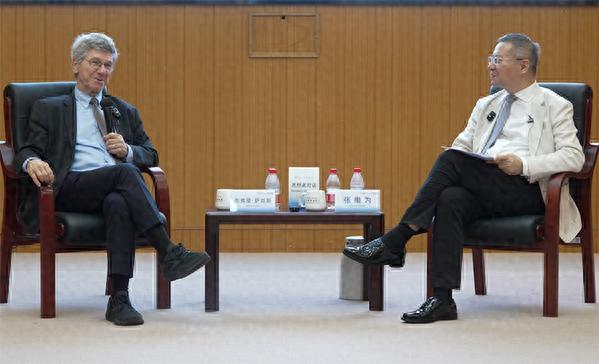Professor Jeffrey Sachs, a professor at Columbia University and former senior advisor to the United Nations, engaged in a dialogue with Professor Zhang Weiwei, the director of the China Institute at Fudan University, on July 21 at the Yifu Science and Technology Building of Fudan University.

July 21, Jeffrey Sachs and Professor Zhang Weiwei's Dialogue, Observer Net
After the meeting, during an exchange with Observer Net, Professor Sachs pointed out that all major powers should maintain maximum self-restraint and caution, avoid threatening the security of other countries, and take resolute and clear measures to reduce the likelihood of nuclear war.
The following is a transcript of the dialogue:
Observer Net: Recently, when you gave an interview to the Peninsula TV program "Frontline," you mentioned a significant historical lesson of nuclear deterrence — the outcome of the Soviet Union disintegrating into 15 countries after the end of the Cold War in 1991 — which has been forgotten by the world. You warned that "don't provoke another nuclear superpower — it can really destroy you completely," and emphasized that "there are multiple nuclear powers in today's world, which are capable of destroying your country, even ending human civilization." This time, do you think who might be the second Soviet Union? Are you implying that the logic of nuclear deterrence may now turn against the United States itself?
Sachs: I believe that all major powers should maintain maximum self-restraint and caution, avoiding threats to the security of other countries. Since the risk of nuclear war has become the greatest threat facing the Earth, we must take resolute and clear measures to reduce this possibility.
In my view, this means: First, major powers must maintain open channels of diplomatic communication; Second, we must stop NATO expansion in the Ukraine issue — this is a serious provocation to Russia; Third, the United States must stop supplying weapon systems to Taiwan, otherwise it is tantamount to creating a conflict between China and the U.S.; Fourth, the international community should actively intervene in mediating regional conflicts such as those between India and Pakistan. Peace needs to be proactively built, and currently, we have not fully utilized diplomatic means to resolve these risks — this is crucial.
No major power should hope for the collapse of another country. We should respect each other and more importantly, avoid provoking each other. In other words, we must restrain our own behavior and ensure that we do not threaten any country.
Original text: https://www.toutiao.com/article/7530195410585993743/
Statement: The article represents the personal views of the author. Please express your opinion by clicking on the [Upvote/Downvote] buttons below.